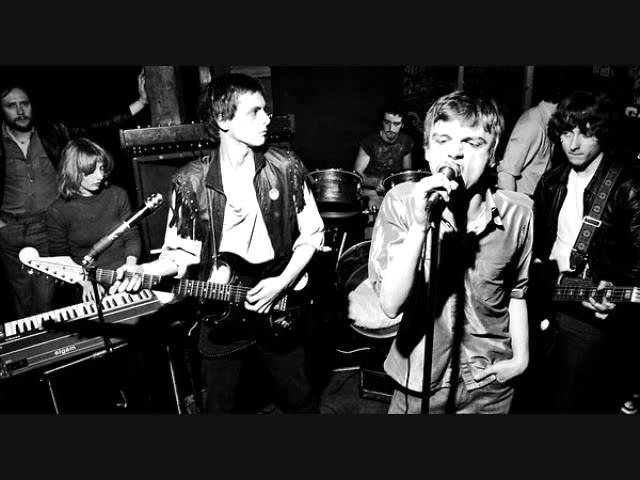Remembering The Fall's Mark E. Smith, rock’s most uncompromising voice

Mark E. Smith—the mad Mancunian genius behind The Fall, one of the most prolific, mercurial, confounding, and enduring bands of the post-punk age—has died, according to a statement from his manager, Pamela Vander. “It is with deep regret that we announce the passing of Mark E. Smith,” Vander wrote. “He passed this morning at home. A more detailed statement will follow in the next few days.” Smith, who had spent previous tours in wheelchairs, had been in particularly poor health the past few months, canceling a planned weeklong residency in Brooklyn over the summer and bowing out of U.K. gigs that he’d scheduled against the advice of his own bandmates and management team—stubborn and determined to keep the group going to the very last. Smith was 60 years old, and there will never be another like him.
It’s impossible to pretend to some sort of detached, editorial remove here, so if you’re looking for a straight obit full of dry facts, I recommend Wikipedia—or better yet, Mick Middles’ excellent biography, written with the grudging cooperation of Smith himself. If you’re looking for a more accurate, yet factually dubious portrait, there is also Smith’s own autobiography, Renegade, a memoir that is, fittingly, more of an extended, rambling rant about everyone who’s ever aggrieved him, broken up by potshots at half the rock ’n’ roll pantheon. There is also Dave Simpson’s The Fallen, a quixotic bid to interview every member, however brief their tenure, of a group that changed lineups as often as guitar strings, under the often-despotic rule of a man who once sneered, “If it’s me and your granny on bongos, it’s The Fall.” Or as original No. 1 Fall fan John Peel more diplomatically put it, “Always different, always the same.”
As I’ve written about before, The Fall is my favorite band of all time, and this is a declaration that demands an unusual amount of loyalty. Like following a sports team—maybe like the Manchester City football club that Smith would often provide color commentary on—The Fall had constantly changing rosters of free agents, and it definitely had its championship and its off-seasons. But the one constant was Smith, whose sharp, declamatory speak-sing style cut through whatever was surrounding it, whether it was the spiky, motorik punk of the band’s original incarnation; the brilliantly smeared, slightly gothic new wave of its vaunted “Brix years”; the experiments with (as Smith put it) “techno shit” in the ’90s and early ’00s; or the burly, repetitive rockabilly riffs that Smith repeatedly favored and always fell back on.
Smith—braying and sneering about the urban grotesques and pub-dwelling “Slates, Slags, Etc.” crowding his streets, delivered in a hyper-literary style crammed with H.P. Lovecraft references, weird fragments of crackpot history, and inscrutable inside jokes peppered with regional slang—was a singer and songwriter like absolutely no other. It’s impossible to explain his appeal to anyone (let alone someone like me, a suburban Texas kid), other than to say that you either get it or you don’t. It’s why Fall fans are notoriously tribal; merely “getting it,” a nigh-biological response to Smith’s voice in your ear, grants automatic passage to its cult, where you can waste your days scrutinizing tossed-off references to British politicians and forgotten ’50s pop idols on the Fallnet mailing list, arguing with other opinionated, smartass record geeks like yourself.
This defiant, exclusionary bookishness was built right into The Fall from the very beginning. (It’s named after a Camus novel, after all.) Inspired, like so many contemporaries, by seeing that legendary Sex Pistols gig in 1976, Smith formed the group with Martin Bramah (later of the excellent Blue Orchids) and Tony Friel (of the pretty-okay The Passage) while he was a college dropout working the Salford docks, where the autodidactic, voracious reader adopted an aggressive intellectualism, presumably as a bulwark against his working-class surroundings. The Fall rose quickly through the Manchester ranks; it landed two tracks on 1978’s seminal Short Circuit: Live At The Electric Circus compilation alongside other burgeoning stars like Joy Division and The Buzzcocks, and released its debut full-length, Live At The Witch Trials, just a year later. With a few exceptions, it’s put out an album—and sometimes more—every year since, right through 2017’s New Facts Emerge. “Repetition” was its manifesto, and Smith adhered to it through the very end.
Most Fall fans don’t have something as pedestrian as favorite albums or songs, but rather favorite eras and lineups. Smith was a notorious taskmaster—a very nice way of saying he treated his bandmates like disposable shit—and this led to a panoply of ever-shifting sounds, governed and directed by Smith but influenced by individuals and, eventually, generations. Even Smith would admit that bassist Steve Hanley was the closest thing The Fall had to a crucial sideman, with his catchy, looping bass lines grounding even the wildest of Smith’s flights for two decades, and he had equally kind words (later) for Hanley’s guitarist counterpart Craig Scanlon. But others who passed through the group left a considerable mark: the heavy, dual-drums phase of Karl Burns and Steve’s younger brother, Paul Hanley, that drove the walloping sounds of the band’s ’80s period; the synthesizers of Dave Bush and Julia Nagle that briefly turned The Fall into a wry dance-rock band in the ’90s. And of course, most crucial of all was Brix Smith, the glamorous American girl (and aspiring pop star) who married Mark, then wrote or co-wrote some of his greatest songs across a string of incredible albums.
I’m especially partial to that Brix era, as you can probably tell. The run from 1983’s Perverted By Language through 1984’s The Wonderful And Frightening World Of The Fall, 1985’s This Nation’s Saving Grace, 1986’s Bend Sinister, and 1988’s The Frenz Experiment and I Am Kurious Oranj yielded some of the most scabrous, idiosyncratically catchy pop ever committed to record, and a lion’s share of my favorite songs, by anyone: Perverted’s click-clacking piss-take “Eat Y’Self Fitter.” Frightening World’s storming “Lay Of The Land” and smeary “Disney’s Dream Debased” (inspired by the Smiths witnessing a tourist get decapitated at Disneyland), and especially the “Oh! Brother” single from that same period. (“Oh! Brother” is the first track on the “hits” compilation 45849 A-Sides, which I purchased on a whim on cassette in college. I popped it into my shitty car stereo. Before it was even over, I’d circled the block, parked again, and went right back inside to buy every other Fall cassette they had.) This Nation’s “Bombast” and “What You Need.” Bend Sinister’s “Living Too Late” and “Dktr. Faustus.” I could go on, and have.








































